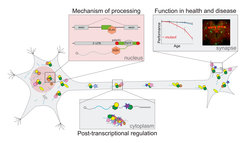Research
Hilgers Lab
Neurons are uniquely complex cells whose function relies heavily on gene regulatory mechanisms such as alternative splicing, alternative polyadenylation, and post-transcriptional regulation. Although relatively little is known about how these mechanisms control neuronal development and function, the importance of RNA-directed regulation in the brain is exemplified by its implication in neurological diseases. To understand the molecular processes underlying such pathologies, we need to gain mechanistic and functional insight into how RNA diversity is regulated.
We use Drosophila as a model system for neurodevelopmental genetics. We focus in particular, on RNA processes regulated by RNA-binding proteins of the highly conserved ELAV family of pan-neuronal proteins.
Neurons are characterized by the expression of RNA sequences that are found in no other cell type: neuron-specific mRNA splice isoforms, circular RNAs, microRNAs, and ultra-long 3’UTRs. We study how these neuronal RNA signatures are specifically produced, post-transcriptionally regulated, and how they are involved in neuronal development and function.

